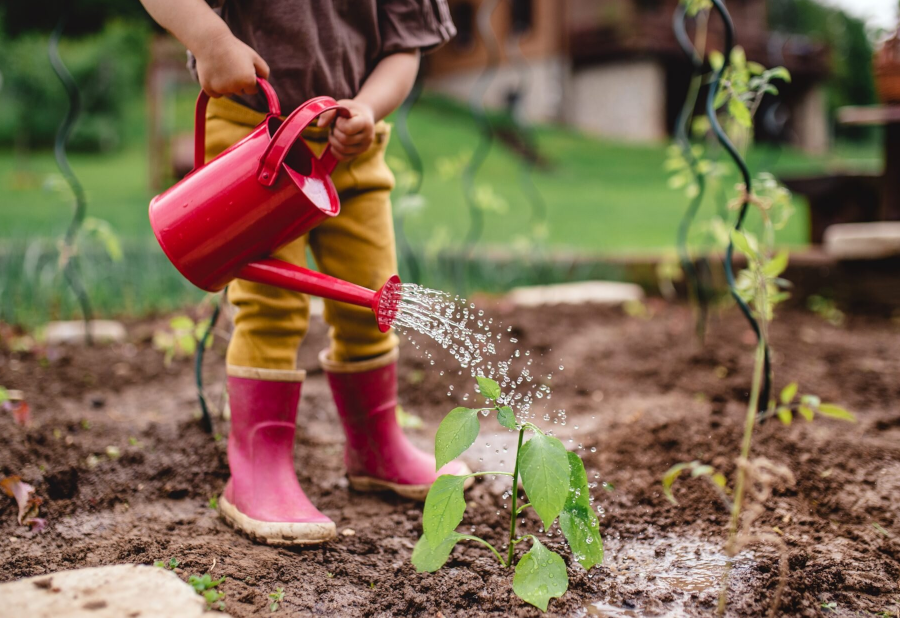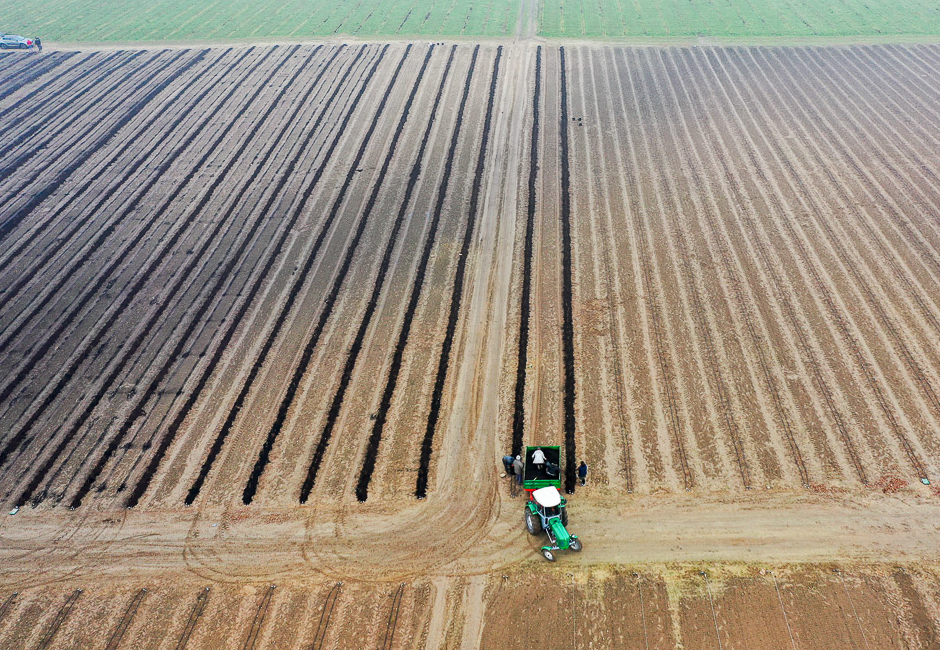


Black Gold
with Nature
all plant species



Carbohort
A producer of organic substrates
and humus extract
CARBOHORT is a family company that uses natural deposits of soft brown coal – lignite, located in Poland. The use of brown coal or “black gold”, as we call it, in the cultivation of plants is not something completely new, but unfortunately much forgotten. We often joke that this is really the „oldest novelty” that we want to re-introduce to farmers and gardeners. We started our business with an idea of co-creating a new quality of crops in full harmony with Nature, and also for the sake of the deteriorating soil condition in Poland. By creating innovative products – CARBOMAT and CARBOHUMIC we want to contribute to the improvement of the quality of produced food and have a positive impact on the surrounding natural environment.

Our products
CARBOHUMIC
Recommended to be used in:
- agriculture
- horticulture
- at home and in the garden
- forestry
CARBOMAT
Available in the form of:
- soil conditioner
- soil deacidifier
- growing medium
- mulch
The highest quality
We make every effort to ensure that the products we offer meet your expectations.
Care for nature
We make sure that our products have a positive impact on the natural environment.
Help and assistance
In case of any doubts, be sure to contact us. We will certainly help and advise.
Technical Coordinator
phone: +48 506 383 715
e-mail: sylwia.gabrysz@carbohort.com
The world we live in changes very dynamically

The world we live in changes very dynamically; environmental pollution, deteriorating food quality, and thus our health, climate change… in our opinion, the situation we are in is dramatic and requires our immediate intervention. Thinking about future generations we must pay more and more attention to our closest surroundings. We must demand more not from governments, public and private institutions, companies etc., but above all from ourselves. After all, the environment is a common good, a property of all humanity and we are all responsible for it to the same extent.
Our goals
Bottom-up initiatives aimed towards improving health through consuming healthy food
We want to mobilize people to own even the smallest crops; home gardens or those on the rooftops, herbariums on the windowsill or terrace, vegetable gardens in schools – in other words, everything that will allow you to feel the satisfaction of growing your own tasty, healthy and organic food. We want to refute the stereotype that having own crops is as tedious and time-consuming as it normally seems to most of us. Only by eating our own produce, we are absolutely sure about their quality.


A paradigm shift regarding the use of brown coal
We want to change the way of thinking, show that brown coal is involved not only in burning and emission of CO2 into the atmosphere, and thus accelerating global warming, but something quite the opposite – the sequestration of this greenhouse gas, which takes place in two forms:
- from air through plants,
- from soil through biochar (Corg) which is within the brown coal.
Furthermore, in times of growing importance of healthy and organic produce, the concept of using brown coal may be the key element in cultivating plants.
Environmental protection through use of means neutral to nature – soils, rivers, groundwaters
Currently, there are many phenomena that have a very negative impact on the surrounding natural environment, especially soils. One should mention at least: the uncontrolled and excessive urbanization, development of high-emission transportation or soil degradation as a result of intense human activity. All this result in global arable land shrinkage by around 1% annually. It is worth recalling that 100-500 years are needed to produce 1 cm of soil in natural conditions. That is why it is so important to:
- conduct proper agricultural management using mainly natural fertilizers, only after – and as a supplement – mineral fertilizers and plant protection products,
- prevent erosion and restore soil use values by enriching the soil with humus, afforestation of wastelands and land melioration,
- prevent soil pollution from municipal sources – limiting the amount of waste, running a proper economy (waste segregation, composting, hazardous waste collection) and construction of sewage treatment plants,
- limiti industrial sources of soil pollution – using modern environmentally friendly technologies and proper post-production waste management,
- cleanse soil of toxic substances and to deacidify acidified soils,
- limit the takeover of land caused by urbanisation.


Fighting climate change
Climate change is a global problem with serious ecological, social, economic, political and revenue-sharing consequences, and represents one of the greatest challenges for humanity in this century. Probably the most severe consequences of climate change will fall on developing countries. Many of the poor inhabitants of our planet occupy areas particularly vulnerable to the effects of global warming, and their livelihoods depend largely on natural resources, such as agriculture, fisheries and forest resources. As of today, they have no other means of subsistence or resources, that would allow them to adapt to the effects of climate change or face catastrophic situations. Therefore, in order to prevent the growing pressure of migration and thus emerging social unrest, it is so important to allow the population to remain native in their current places of residence, inter alia by conditioning areas not yet used for cultivation, including desert areas.
Change of habits in greenhouse and field cultivation
We believe that there are no shortcuts in food production. In the pursuit of profit, cost reduction and crop aesthetics, we have made compromises that will have a negative impact on our health and the environment around us in the long run. We want to motivate as many food producers as possible to take responsibility for the health of other people and the environment in which they live. We also want to encourage the citizens to decide mostly on local products, hence avoid long-distance transportations and mass fruit and vegetable factories.

I.
Bottom-up initiatives aimed towards improving health through consuming healthy food
We want to mobilize people to own even the smallest crops; home gardens or those on the rooftops, herbariums on the windowsill or terrace, vegetable gardens in schools – in other words, everything that will allow you to feel the satisfaction of growing your own tasty, healthy and organic food. We want to refute the stereotype that having own crops is as tedious and time-consuming as it normally seems to most of us. Only by eating our own produce, we are absolutely sure about their quality.
II.
A paradigm shift regarding the use of brown coal
We want to change the way of thinking, show that brown coal is involved not only in burning and emission of CO2 into the atmosphere, and thus accelerating global warming, but something quite the opposite – the sequestration of this greenhouse gas, which takes place in two forms:
- from air through plants,
- from soil through biochar (Corg) which is within the brown coal.
Furthermore, in times of growing importance of healthy and organic produce, the concept of using brown coal may be the key element in cultivating plants.
III.
Environmental protection through use of means neutral to nature – soils, rivers, groundwaters
Currently, there are many phenomena that have a very negative impact on the surrounding natural environment, especially soils. One should mention at least: the uncontrolled and excessive urbanization, development of high-emission transportation or soil degradation as a result of intense human activity. All this result in global arable land shrinkage by around 1% annually. It is worth recalling that 100-500 years are needed to produce 1 cm of soil in natural conditions. That is why it is so important to:
- conduct proper agricultural management using mainly natural fertilizers, only after – and as a supplement – mineral fertilizers and plant protection products,
- prevent erosion and restore soil use values by enriching the soil with humus, afforestation of wastelands and land melioration,
- prevent soil pollution from municipal sources – limiting the amount of waste, running a proper economy (waste segregation, composting, hazardous waste collection) and construction of sewage treatment plants,
- limiti industrial sources of soil pollution – using modern environmentally friendly technologies and proper post-production waste management,
- cleanse soil of toxic substances and to deacidify acidified soils,
- limit the takeover of land caused by urbanisation.
IV.
Fighting climate change
Climate change is a global problem with serious ecological, social, economic, political and revenue-sharing consequences, and represents one of the greatest challenges for humanity in this century. Probably the most severe consequences of climate change will fall on developing countries. Many of the poor inhabitants of our planet occupy areas particularly vulnerable to the effects of global warming, and their livelihoods depend largely on natural resources, such as agriculture, fisheries and forest resources. As of today, they have no other means of subsistence or resources, that would allow them to adapt to the effects of climate change or face catastrophic situations. Therefore, in order to prevent the growing pressure of migration and thus emerging social unrest, it is so important to allow the population to remain native in their current places of residence, inter alia by conditioning areas not yet used for cultivation, including desert areas.
V.
Change of habits in greenhouse and field cultivation
We believe that there are no shortcuts in food production. In the pursuit of profit, cost reduction and crop aesthetics, we have made compromises that will have a negative impact on our health and the environment around us in the long run. We want to motivate as many food producers as possible to take responsibility for the health of other people and the environment in which they live. We also want to encourage the citizens to decide mostly on local products, hence avoid long-distance transportations and mass fruit and vegetable factories.
Earth does not belong to us. We borrow it from our children
Let us change the future together!
The Carbohort Team
